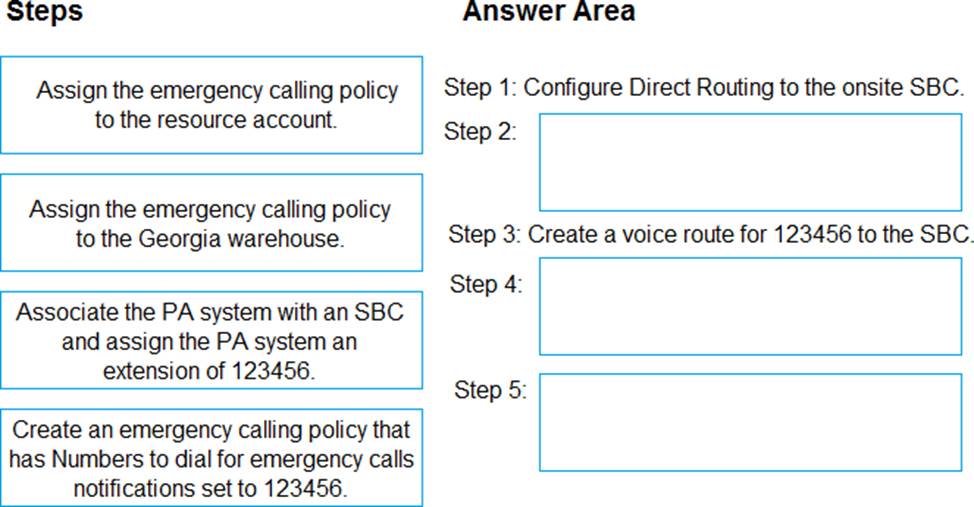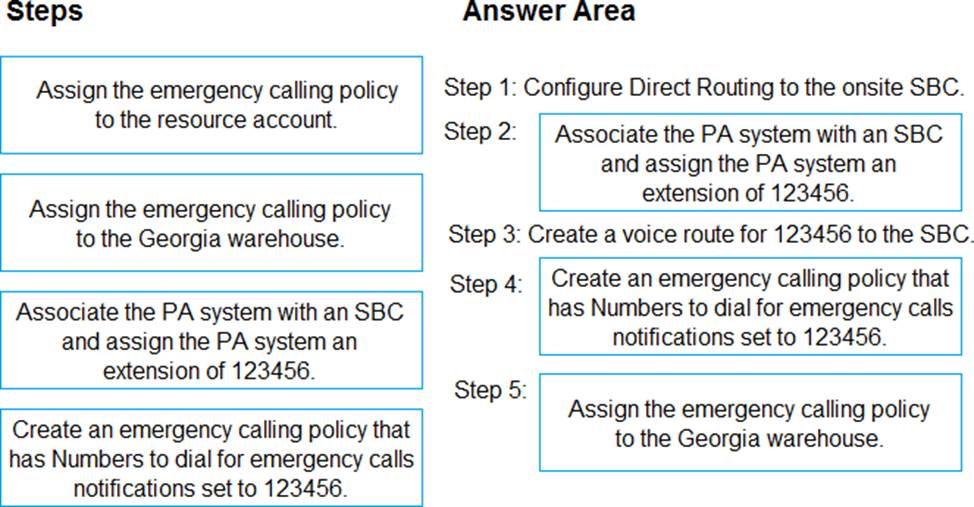Which sequence of steps should you perform?
Topic 1, Litware Case Study 1
Overview
This is a case study. Case studies are not timed separately. You can use as much exam time as you would like to complete each case. However, there may be additional case studies and sections on this exam. You must manage your time to ensure that you are able to complete all questions included on this exam in the time provided.
To answer the questions included in a case study, you will need to reference into rm.it ion that is provided in the case study. Case studies might contain exhibits and other resources that provide more information about the scenario that is described in the case study. Each question is independent of the other questions in this case study.
At the end of this case study, a review screen will appear. This screen allows you to review your answers and to make changes before you move to the next section of the exam. After you begin a new section, you cannot return to this section-To start the case study
To display the first question in this case study, click the Next button. Use the buttons in the left pane to explore the content of the case study before you answer the questions. Clicking these buttons displays information such as business requirements, existing environment, and problem statements. If the case study has an All Information tab, note that the information displayed is identical to the information displayed on the subsequent tabs. When you are ready to answer a question, click the Question button to return to the question.
Overview
Litware, Inc. is an online retailer.
Litware is replacing its telephony platform with Microsoft Teams Phone.
Currently, all users are assigned Microsoft 365 E3 licenses.
Telephony Environment
The existing telecommunications system has several third-party IP-PBXes at the corporate and warehouse sites- Currently, the PBXes are linked through the corporate WAN and an inter-office dial plan is in place.
A unique PSTN direct inward dial (DID) is assigned to each user. The last five digits of each DID are used as an extension.
Litware piloted Microsoft Skype for Business Server Enterprise Voice, but has since decided to migrate directly to Teams Phone. During the pilot, a response group was created, and the response group is still in use. Agents in the response group use Skype for Business Server-certified handsets.
Locations
Litware has global retail stores and datacenters-
The telephony topology contains the following four types of sites:
Corporate sites
The corporate sites contain information workers who collaborate by using the Teams desktop client and SharePoint Online.
The reception desk at each corporate site has an analog intercom with an integrated door control.
Each intercom connects to an existing PBX by using an FXS Analog Telephony Adapter (ATA).
SIP trunks are delivered directJy to the site by using a resilient WAN that connects directly to the on-site PBX solution.
Wa rehouse sites
The warehouse sites are critical to the business. Users at these sites use either the Teams desktop client or the Teams mobile client.
Each warehouse has a public announcement (PA) system that connects to the PBX by using a SIP ATA along with the sites’ existing ISDN trunks.
Currently, users ax the company’s warehouse in Georgia can call the PA system by dialing 123456. All calls to emergency services from the warehouses are played over the warehouses’ PA system automatically.
WAN connectivity at the warehouses can be unreliable, so local PSTN connectivity is preferred as compared to centrally hosted connectivity.
Retail sites
Each retail site has only one or two desk phones and a specialized point of sale (POS) computer that cannot run the desktop or web versions of the Teams client-Users at the retail sites have the Teams app and an associated data plan installed on their mobile device. Currently, each retail site uses a managed SD-WAN appliance to connect to both the internet and the corporate WAN. The users report that in the event of an internet outage at the retail sites, they can use their mobile devices, which have strong reception.
Planned Changes
Litware plans to implement the following changes:
• Maintain the existing emergency call PA integration.
• Replace the existing IP-PBX solutions by using Teams Phone.
• Consolidate all its PSTN trunks by using region-specific datacenters, wherever possible. During the planned deployment of Teams Phone, Litware will open a new retail site in the United Kingdom that will have five users. Litware does not have any existing telephony in the United Kingdom. Management at the new retail site wants to use Microsoft Teams Calling Plans for the users.
You are opening a new warehouse site in Melbourne. The new warehouse will connect to a phone carrier by using a Session Border Controller (SBC). Dialing rules are an area code of two digits beginning with a zero followed by a subscriber number of eight digits. For example, an E.164 number of +61370105550 will be translated to 03 7010 5550, and +61255505550 will be translated to 02 5550 5550.
Technical Requirements
Litware identifies the following technical requirements: – Minimize the amount of voice traffic over the-WAN.
– Whenever possible, use natively supported Teams solutions.
• Avoid replacing existing analog device adapters and SIP phones.
• Assign a Microsoft 365 Phone System license to all the users listed in a CSV file.
• Ensure that the retail sites can place and receive calls in the event of a WAN failure.
• Assign a phone number of +61370105550 to a user named User1. User1 is located at a corporate site.
• Ensure that the warehouse sites maintain calling in the event of an internet outage or Teams service failure.
• Provide users at the United Kingdom retail site with phone numbers. The users must only be allowed to make in-country calls.
• Replace the response group from the Skype for Business Server Voice Enterprise pilot with a call
queue. The agents must be able to use their existing handset.
DRAG DROP
You are replacing the on-site PBX at the Georgia warehouse with Teams.
You need to maintain the functionality of the PBX after migrating to Teams.
Which sequence of steps should you perform? To answer, drag the appropriate steps to the correct locations. Each step may be used once, more than once, or not at all. You may need to drag the split bar between panes or scroll to view content. NOTE: Each correct selection is worth one point.

Answer: 
Explanation:
Reference: https://docs.microsoft.com/en-us/microsoftteams/manage-emergency-calling-policies
Latest MS-721 Dumps Valid Version with 156 Q&As
Latest And Valid Q&A | Instant Download | Once Fail, Full Refund

